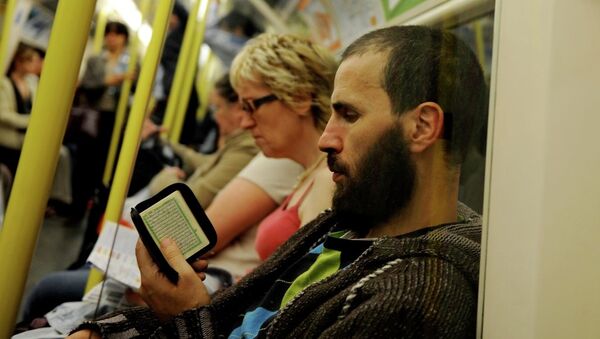After the July 7th bombings in 2005, for which al-Qaeda claimed responsibility, the government introduced the Terrorism Act 2006, prohibiting the 'glorification' of terrorism and increasing the number of days a suspected terrorist could be held without charge from 14 days to 28.
But as the government reinforced anti-terror laws, the tensions between predominantly Muslim communities in Britain increased as well.
'When I look at those memorial obelisks on Tuesday I will think of people killed in my train AND those killed in the bombing of Baghdad.'
— CAGE (@UK_CAGE) July 7, 2015
The Islamic Human Rights Commission says: "Prevent has not succeeded in staunching terrorism. Reports have concluded that the Prevent regime of attempting to stop young Muslims from being radicalized is not working and is simply alienating Muslims in Britain by serving as a cover for intelligence gathering on the community."
#Prevent — UK government's anti-extremism strategy — Targeting our children! We Muslims need to wake up. pic.twitter.com/tjkbcfWb6J
— Abu Hudhayfah (@AHudhayfah) July 5, 2015
Ten years after the 7/7 attack, CAGE, an independent advocacy organization that works with communities affected by the War on Terror says: "PREVENT is a toxic policy that fails the communities it is seeking to reach."
CAGE spokesperson Ibrahim Mohamoud said:
"What began as a response to the 7/7 bombings, has expanded the security state and threatens basic freedoms, making some communities feel as though they are living in a police state."
"Many of the methods being used under the PREVENT program are based on highly dubious and questionable evidence, with religiosity seen as a repeated indicator of radicalization. Such actions are likely to create or perpetuate existing grievances, and can cause an individual to become radicalized.
"The lack of transparency surrounding PREVENT as well as the strategy’s unaccountability mean that the unfair practices of PREVENT officers go unchallenged and a two-tier justice system exists."
CAGE is calling for an end to the government’s program and instead center focus on striking up a dialogue with communities.
And CAGE isn’t alone in its criticism for the program. Baroness Manningham Buller, former head of MI5 told the House of Lords that it is "clearly not working". She believes that the decision by 600 Britons to travel to Iraq and Syria to join Islamic State militants was evidence enough that the government program had failed.
Prevention or Radicalization?
A recent case in the UK involving three mothers from Bradford who took their nine children to Syria via Turkey suggests the British authorities are not doing enough to prevent the radicalization of men women and children.
Since their disappearance, two of their husbands, Mohammed Shoaib and Akhtar Iqbal have suggested that British police are partly responsible for the radicalization of the three sisters.
They claim that officers encouraged their radicalization by urging the women to contact their brother who had already left for Syria and believed to be fighting with IS militants.
British media reported that a letter from the husband’s lawyers said "plainly the North East Counter Terrorism Unit (Nectu) has been complicit in the grooming and radicalizing of the women."
The accusations have been rejected by Downing Street and Members of the Parliament. Meanwhile Prime Minister David Cameron is fast-tracking a controversial new Investigatory Powers Bill to allow police and security services power to access, spy and on all communications data by a suspected terrorist.



